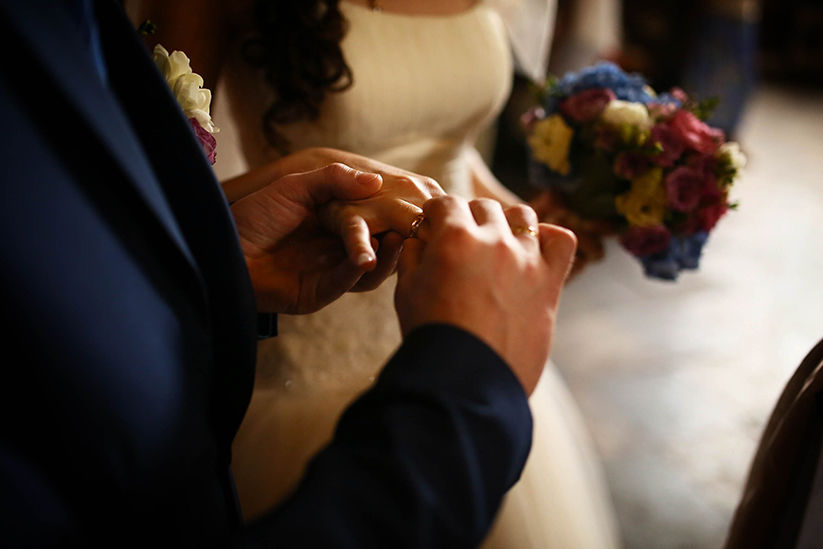For a document that was intended to settle the debate unleashed by two tumultuous Synods of Bishops called to discuss issues related to marriage and family life, “Amoris Laetitia” — Pope Francis’ treatise on the family — instead seems notable for how much it’s left unresolved and still-disputed.
For those who haven’t been following every twist and turn, “Amoris Laetitia” is a broad treatment by a tremendously pastoral pope, and it can’t be reduced to a single contested point. Nevertheless, the most polarizing question during the synods was whether divorced and civilly remarried Catholics could receive the sacrament of the Eucharist under at least some circumstances, and everyone read the text with one eye to what Francis would say on that question.
In the document, Francis addressed the point only in a footnote — footnote 351 — which appeared to leave the door open for a “yes” answer, but not doing so in a way that explicitly changed either Church law or teaching. That cleared the path for bishops to interpret the implications of the pope’s ruling differently, with some taking a restrictive approach and others a more permissive line.
That is exactly what’s happened, with some dioceses around the world declaring that nothing has changed and that divorced and civilly remarried Catholics may receive Communion only if they live as “brother and sister,” meaning without sexual intimacy, and others saying they may come forward for Communion after a process of discernment with a priest or bishop.
Another new milestone in the debate recently appeared in Crux in an interview with Jesuit Father Antonio Spadaro, in which Father Spadaro insists that some of the attacks directed at the pope’s document reflect a “bad spirit,” and that anyone who’s sincere doesn’t need any more clarification on the Communion debate than has already been given.
“I think a questioning conscience can easily find all the responses it is seeking, if it is seeking sincerely,” said Spadaro, and, given Spadaro’s status as a close papal adviser and confidante, one has to take that seriously.
On the other hand, there clearly are other serious people who don’t believe every last question about the meaning of “Amoris” has been definitively resolved.
Recently, four cardinals, including American Cardinal Raymond Burke, wrote Pope Francis asking him to resolve what they described as “confusion” and “disorientation” as a result of his document. The pope declined to respond, prompting the cardinals to make their request public.
Recently, German Cardinal Gerhard Ludwig Müller, Prefect of the Vatican’s Congregation for the Doctrine of the Faith, was asked to comment on the situation by Kathpress, an Austrian Catholic news agency partly funded by the Austrian bishops.
Müller said his office speaks only with the authority of the pope and can’t get involved in a “controversy of opinions” on its own accord, and also appealed to everyone involved in the conversation to “remain objective” and not succumb to “polarization.”
However, Müller also left open the possibility that Francis might commission the doctrinal congregation to create an “ad-hoc commission” to resolve the dispute. That, to be clear, is not the language of someone who believes that “Amoris,” and the responses to it to date, have resolved every possible doubt.
Müller also said that “Amoris” should not be interpreted as if earlier responses from other popes and the doctrinal congregation were no longer valid. Yet since those responses were basically “no” and “Amoris” seemingly said “yes” on the Communion issue, that’s not exactly a contribution to greater clarity.
In a separate interview, noted German Catholic philosopher Robert Spaemann told the Italian news site Nuova BQ that the pope’s apparent unwillingness to deliver a binding “yes” or “no” might be in contrast to Jesus’ own style of teaching.
“The pope clearly has a deep aversion facing decisions that require a ‘yes’ or ‘no,’” Spaemann said.
“Yet Christ, the Lord of the Church, often places his disciples in front of decisions like that. Precisely on the question that referred to adultery, he ‘shocked’ the apostles for the simplicity and clarity of his doctrine,” he said.
Spaemann is on record as arguing that the teaching of “Amoris’” footnote on the divorced and remarried contradicts earlier Church teaching, so his comments here should be no surprise.
What are we to take away from all this? For now, two conclusions seem clear.
First, despite the insistence of papal allies that everything is perfectly clear about what the deal is with regard to access to Communion, there’s an important segment of the Church that just doesn’t believe that’s true. Whether they’re a minority or a majority doesn’t matter for the moment — they can’t simply be dismissed, because they include senior figures in the hierarchy.
By the way, Spadaro’s willingness to engage in an exchange with Ivereigh represents something that hadn’t been done so far, which is to respond directly to the four cardinals. In itself, that’s arguably an acknowledgment there are questions that still need to be answered.
Second, unless and until Pope Francis delivers a binding magisterial response, the forecast is for local control. We’ve already seen various bishops deliver clearly divergent responses about what the implications of “Amoris” will be in their dioceses, and there’s nothing to suggest that won’t continue in the absence of a clear and indisputable papal declaration.
Depending on one’s point of view, that could either be styled as a long-overdue step toward the “healthy decentralization” in Catholicism to which Francis has often referred, or as doctrinal chaos, but in any event, it clearly seems to be where we are.
This article origianlly appeared at the Catholic news site cruxnow.com

